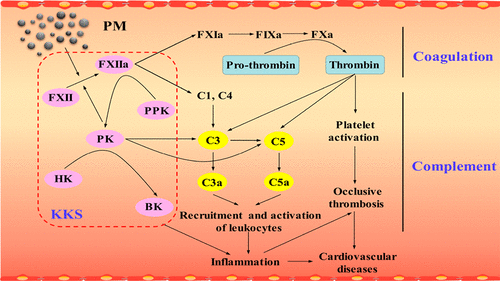当前位置:
X-MOL 学术
›
Environ. Sci. Technol.
›
论文详情
Our official English website, www.x-mol.net, welcomes your
feedback! (Note: you will need to create a separate account there.)
Airborne Fine Particles Induce Hematological Effects through Regulating the Crosstalk of the Kallikrein-Kinin, Complement, and Coagulation Systems
Environmental Science & Technology ( IF 10.8 ) Pub Date : 2019-02-20 , DOI: 10.1021/acs.est.8b05817
Xiaoting Jin 1, 2 , Qianchi Ma 1, 3 , Zhendong Sun 1, 3 , Xuezhi Yang 1, 3 , Qunfang Zhou 1, 3, 4 , Guangbo Qu 1, 3, 4 , Qian Liu 1, 3, 4 , Chunyang Liao 1 , Zhuoyu Li 2 , Guibin Jiang 1, 3
Environmental Science & Technology ( IF 10.8 ) Pub Date : 2019-02-20 , DOI: 10.1021/acs.est.8b05817
Xiaoting Jin 1, 2 , Qianchi Ma 1, 3 , Zhendong Sun 1, 3 , Xuezhi Yang 1, 3 , Qunfang Zhou 1, 3, 4 , Guangbo Qu 1, 3, 4 , Qian Liu 1, 3, 4 , Chunyang Liao 1 , Zhuoyu Li 2 , Guibin Jiang 1, 3
Affiliation

|
Particulate air pollution caused by human activities has drawn global attention due to its potential health risks. Considering the inevitable contact of inhaled airborne fine particulate matter (PM) with plasma, the hematological effects of PM are worthy of study. In this study, the potential effect of PM on hematological homeostasis through triggering the crosstalk of the kallikrein-kinin system (KKS), complement, and coagulation systems in plasma was investigated. The ex vivo, in vitro, and in vivo KKS activation assays confirmed that PM samples could efficiently cause the cascade activation of key zymogens in the KKS, wherein the particles coupled with lipopolysaccharide attachment provided substantial contribution. The binding of Hageman factor XII (FXII) with PM samples and its subsequent autoactivation initiated this process. The crucial elements in the complement cascade, including complement 3 (C3) and complement 5 (C5), and coagulation system (prothrombin) were also found to be actively induced by PM exposure, which was regulated by the interplay of KKS activation. The data provided solid evidence on hematological effects of airborne PM through inducing the activation of the KKS, complement, and coagulation systems, which would be valuable in the risk assessment on air-pollution-related cardiovascular diseases.
中文翻译:

机载微粒通过调节激肽释放酶-激肽,补体和凝血系统的串扰来诱导血液学影响。
人类活动引起的颗粒物空气污染由于其潜在的健康风险而引起了全球关注。考虑到吸入的空气中细颗粒物(PM)不可避免地与血浆接触,因此PM的血液学影响值得研究。在这项研究中,通过触发血浆中激肽释放酶-激肽系统(KKS),补体和凝血系统的串扰,研究了PM对血液稳态的潜在影响。体外,体外和体内KKS活化试验证实,PM样品可以有效地引起KKS中关键酶原的级联活化,其中与脂多糖结合的颗粒发挥了重要作用。Hageman因子XII(FXII)与PM样品的结合及其随后的自动激活引发了这一过程。还发现补体级联中的关键元素,包括补体3(C3)和补体5(C5),以及凝血系统(凝血酶原)是由PM暴露主动诱导的,而PM暴露是由KKS激活的相互作用调节的。这些数据通过诱导KKS,补体和凝血系统的活化,提供了有关机载PM的血液学影响的确凿证据,这对于空气污染相关的心血管疾病的风险评估非常有价值。
更新日期:2019-02-20
中文翻译:

机载微粒通过调节激肽释放酶-激肽,补体和凝血系统的串扰来诱导血液学影响。
人类活动引起的颗粒物空气污染由于其潜在的健康风险而引起了全球关注。考虑到吸入的空气中细颗粒物(PM)不可避免地与血浆接触,因此PM的血液学影响值得研究。在这项研究中,通过触发血浆中激肽释放酶-激肽系统(KKS),补体和凝血系统的串扰,研究了PM对血液稳态的潜在影响。体外,体外和体内KKS活化试验证实,PM样品可以有效地引起KKS中关键酶原的级联活化,其中与脂多糖结合的颗粒发挥了重要作用。Hageman因子XII(FXII)与PM样品的结合及其随后的自动激活引发了这一过程。还发现补体级联中的关键元素,包括补体3(C3)和补体5(C5),以及凝血系统(凝血酶原)是由PM暴露主动诱导的,而PM暴露是由KKS激活的相互作用调节的。这些数据通过诱导KKS,补体和凝血系统的活化,提供了有关机载PM的血液学影响的确凿证据,这对于空气污染相关的心血管疾病的风险评估非常有价值。







































 京公网安备 11010802027423号
京公网安备 11010802027423号